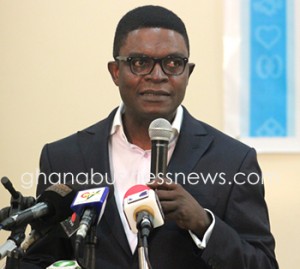Ghana’s electoral system becoming turbulent- Dr. Akwetey

The Executive Director of the Institute for Democratic Governance (IDEG), Dr Emmanuel Akwetey has said Ghana’s electoral system is increasingly becoming turbulent because many invisible hands were funding activities of political parties.
According to him, a lot of money was being channelled into politics and that winning election, especially presidential elections was crucial to those who invested in it.
“Meanwhile, regulatory institutions charged to find out where the parties get money to fund their campaigning and other activities had failed to enforce the law,” he added.
Dr Akwetey who was speaking at the second edition of the Advancement Lecture Series organised by the Institutional Advancement Office of the University of Cape Coast (UCC) said the practice was a serious characteristics of the country’s political system which needed to be addressed.
The lecture was on the theme, “Towards credible 2016 elections: the role of stakeholders in ensuring free, fair, transparent and violent free elections”.
He said people accuse Governments of abuse of incumbency and blatant spending of the tax payers’ money as well as heavily borrowing in election periods, but the opposition also spent a lot of money and no one knew where their money came from.
His comment comes at the back of the Economic and Organised Crime Office (EOCO)’s recent invitation of the Presidential aspirants of the All People’s Congress (APC) and Progressive People’s Party (PPP).
It would be recalled that the EOCO issued a letter to PPP’s Dr Papa Kwesi Nduom requesting him to explain the source of the over GH¢1.7 million he used to pay filing fees at the Electoral Commission (EC) for himself and his party’s parliamentary candidates.
Presidential Candidate of the APC, Hassan Ayariga was also invited to answer questions on the sources of funding for his party in securing vehicles for his campaign.
Dr Akwetey said the political system was also characterized by what he termed “election overloads” whereby unregulated political activities tended to make it difficult to define an election season or period.
He said the country’s political system operated on a four-year cycles, which did not allow political parties to implement policies that transformed lives systematically.
According to Dr Akwetey, there was what he described as “paradox” in the electoral process because the peace and stability the country enjoyed did not translate into its elections, but was often mashed by fear of violence and stabilisation of democracy at every next elections.
He said it was expected that the more progress a country made in democratic elections would help minimize the violence at elections but that was not the case in Ghana.
“We question the results, we do not trust it anymore and it means we have a system which is paradox. The more our system becomes transparent, the less we believe in the outcome. Our system is more transparent than many African countries, but because the people do not know what is being done to correct the wrongs in the process, they tend not to believe in it,” He said.
Dr. Akwetey said even though Ghana practiced a multi-party system, it had become a “duopoly” where the two main parties dominated and were allowed to operate without serious checks on them.
He asserted that the Electoral Commission (EC) often seemed to be more considerate towards the ‘big’ political parties in situations where they flouted the law as against the smaller ones.
He said there were certain dynamics in the democratic system of the country which had made it difficult to determine who wins elections.
The political exclusivism of where the “winner takes all” did not encourage the contribution of other parties and therefore should be a concern to the citizenry.
“After every election, the system somehow closes up. There is the belief that people who are not members of the ruling political party are frustrated in the system because they are not given jobs,” He added.
Source: GNA
